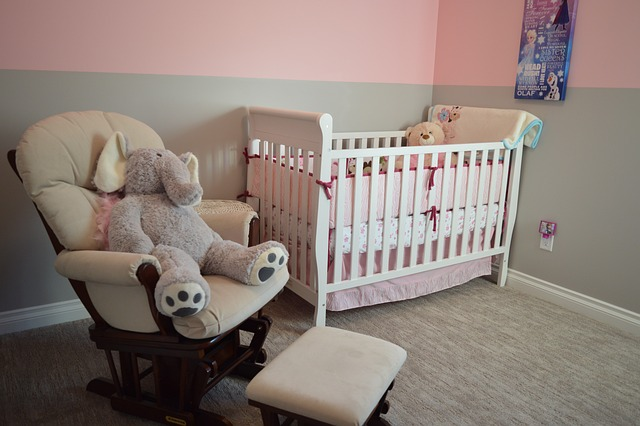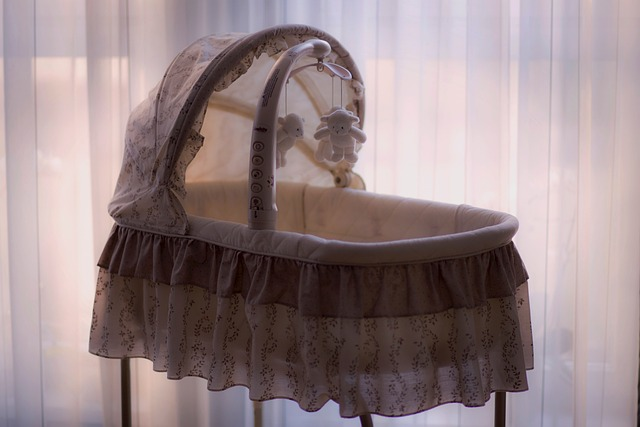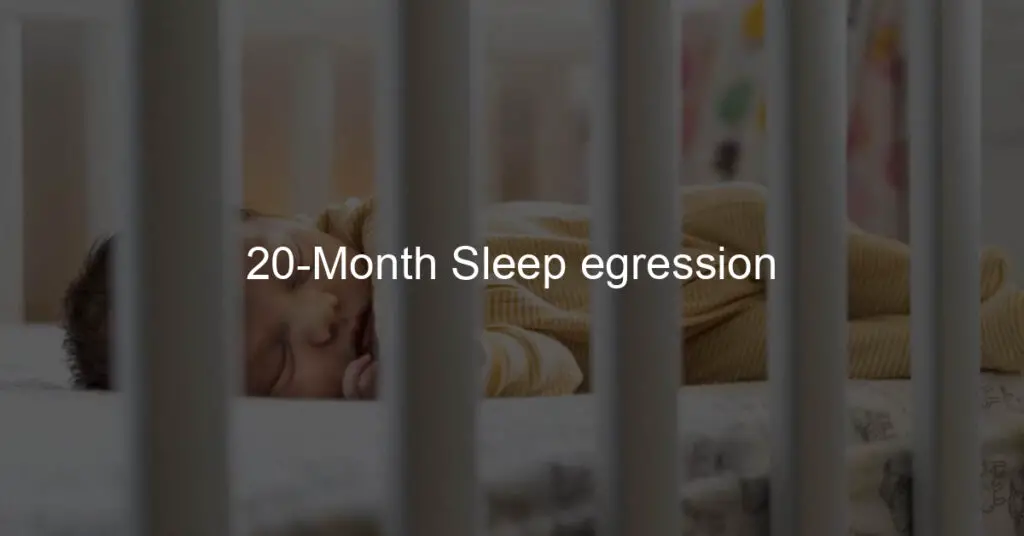Understanding Sleep Regression in Toddlers
As a parent, one of the most challenging phases you might encounter is when your toddler starts experiencing sleep regression. This phase can be confusing and exhausting, but understanding it can help you manage it better. Let’s delve into what sleep regression is, its common signs, and the science behind it.
-
- Defining Sleep Regression
Sleep regression is a period when a toddler who has been sleeping well suddenly starts waking up at night and has difficulty falling back asleep. It’s a normal part of a child’s development and often temporary. Sleep regression can occur at various ages, including at 20 months.
-
- Common Signs of Sleep Regression in Toddlers
Some common signs of sleep regression in toddlers include:
-
-
- Increased night waking
- Difficulty falling asleep at bedtime
- Shorter naps, or skipping naps altogether
- Increased fussiness and clinginess during the day
-
If your toddler is showing these signs, it might be a sign of sleep regression. Remember, every child is unique, and these signs can vary from one child to another.
-
- The Science Behind Sleep Regression
Sleep regression often coincides with a child’s developmental milestones. When toddlers learn new skills, like walking or talking, their sleep patterns can be disrupted. This is because their brains are processing all the new information, which can lead to more frequent awakenings. Additionally, changes in their environment or routine can also trigger sleep regression.
Understanding sleep regression is the first step in managing it. While it can be a challenging time, remember that it’s a normal part of your child’s development and it won’t last forever. In the following sections, we will explore more about 20-month old sleep problems, dealing with sleep regression, and real-life experiences with 20-month sleep regression.

20-Month Old Sleep Problems
As your child grows, you may notice changes in their sleep patterns. One such change could be the 20-month sleep regression. This is a phase where your toddler may experience a sudden shift in their sleep habits, making it difficult for them to fall asleep or stay asleep throughout the night. Let’s delve into the signs of this sleep regression.
Identifying 20-Month Sleep Regression
Identifying a 20-month sleep regression can be challenging, but there are a few key signs to look out for. Here are some of the most common symptoms:
- Changes in sleep patterns: If your child was previously a good sleeper but is now having trouble falling asleep or staying asleep, it could be a sign of sleep regression. This could manifest as sudden difficulty in napping during the day, or waking up frequently during the night.
- Increased night wakings: A clear sign of sleep regression is when your child starts waking up more frequently during the night. This could be due to various reasons such as nightmares, teething, or simply a change in their sleep cycle.
- Resistance to bedtime: If your child is suddenly resisting bedtime, it could be a sign of sleep regression. They might throw tantrums, cry, or find ways to delay going to bed. This resistance can be frustrating for parents, but it’s important to remember that it’s a phase and it will pass.
These signs can be frustrating for both you and your child, but understanding them can help you navigate this challenging phase. Remember, every child is unique and may not exhibit all these signs. It’s always best to consult with a pediatrician if you’re concerned about your child’s sleep habits.
Causes of 20-Month Sleep Regression
Understanding the causes of 20-month sleep regression can be crucial in helping your child navigate this challenging phase. Here are the three main causes:
-
- Developmental Milestones
At around 20 months, your child is experiencing a significant amount of growth and development. This includes learning new skills such as talking, walking, and even potty training. These exciting milestones can disrupt their sleep as their brains are busy processing all the new information. Learn more about developmental milestones here.
-
- Teething
Teething can cause discomfort and pain, making it harder for your child to fall asleep or stay asleep. At 20 months, many toddlers are cutting their second set of molars, which can be particularly painful. Find out more about teething here.
-
- Separation Anxiety
Separation anxiety can peak at around 20 months. This means your child may wake up during the night and have difficulty falling back asleep without your comfort. It’s a normal part of development, but it can disrupt sleep. Learn more about separation anxiety here.
Understanding these causes can help you better support your child during this time. Remember, every child is unique and may experience these factors differently. Patience, consistency, and understanding are key during this phase.

Dealing with Sleep Regression
One of the most challenging aspects of parenting can be dealing with sleep regression. This is a period when your baby or toddler, who has been sleeping well, suddenly starts waking up at night, and has difficulty falling back asleep. Here are some effective parenting tips to help navigate through this phase.
Parenting Tips for Sleep Regression
-
- Maintaining a consistent bedtime routine
Consistency is key when it comes to sleep routines. Establishing a regular bedtime routine can signal to your child that it’s time to wind down and get ready for sleep. This routine could include activities such as a warm bath, reading a book, or singing a lullaby. The predictability of a routine can provide a sense of security and help ease sleep regression.
-
- Creating a sleep-friendly environment
A sleep-friendly environment is crucial for a good night’s sleep. Ensure the room is dark, quiet, and at a comfortable temperature. Consider using a white noise machine or a fan to drown out any potential disruptive noises. A comfortable mattress and pillow can also make a big difference. Remember, the goal is to make the room a place where your child feels safe and relaxed.
-
- Offering comfort and reassurance
Sleep regression can be a stressful time for your child. They may feel scared or anxious, especially if they wake up in the middle of the night. Offering comfort and reassurance can help them feel more secure. This could be in the form of a favorite blanket or stuffed animal, or simply your presence. Remember, it’s important to be patient and understanding during this time.
Dealing with sleep regression can be tough, but remember, it’s just a phase. With patience, consistency, and the right strategies, you can help your child get through it and return to a normal sleep pattern.
Sleep Training for 20-Month Old
At 20 months, your toddler is growing and developing at a rapid pace. This growth can sometimes lead to sleep regression, causing your child to wake up frequently during the night. Sleep training can be an effective way to help your child learn to self-soothe and return to a regular sleep schedule. Here are three methods you can try:
-
- Gradual Withdrawal Method
This method involves slowly reducing your presence in your child’s room until they can fall asleep independently. Start by sitting next to your child’s bed while they fall asleep. Each night, move a little further away until you’re out of the room. It’s important to be patient and consistent with this method. Remember, it’s a gradual process and it may take some time before your child can sleep independently.
-
- Controlled Crying Method
Also known as the Ferber method, controlled crying involves letting your child cry for a predetermined amount of time before you comfort them. Start with short intervals and gradually increase the time. This method can be challenging for parents as it requires you to resist the urge to immediately comfort your crying child. However, it can be effective in teaching your child to self-soothe.
-
- No-Tears Method
The no-tears method focuses on comforting your child whenever they cry. This can involve rocking your child to sleep or providing a soothing back rub. The goal is to create a positive association with bedtime and sleep. While this method can be time-consuming, it can be less stressful for both you and your child.
Remember, every child is unique and what works for one might not work for another. It’s important to choose a method that you feel comfortable with and that suits your child’s temperament and needs. If you’re unsure, consider seeking advice from a pediatrician or a child sleep expert.
Understanding 20-Month Old Sleep Habits
As your child grows, their sleep patterns evolve. By the time they reach 20 months, they have typically settled into a specific sleep routine. Understanding this routine is crucial for their health and development. Let’s delve into the typical sleep habits of a 20-month old, the importance of naps, and how to deal with early morning wakings.
-
- Typical sleep schedule for a 20-month old
At 20 months, most toddlers need about 11-14 hours of sleep every day, including nighttime sleep and naps. They typically wake up between 6-7 AM, have a nap in the afternoon for 1-3 hours, and go to bed between 7-8 PM. However, every child is unique and may have slightly different sleep needs. It’s important to observe your child’s cues and adapt the schedule accordingly.
-
- Importance of naps
Naps play a vital role in a toddler’s life. They not only provide a much-needed break for parents but also contribute to the child’s growth and development. According to Wikipedia, naps can improve mood, alertness, and performance in children. A well-timed afternoon nap can also prevent late-day crankiness and help your child sleep better at night.
-
- Dealing with early morning wakings
Early morning wakings can be a common issue with 20-month olds. If your child is waking up too early, it could be due to various factors such as too much daytime sleep, late naps, or even hunger. To address this, try adjusting their nap schedule, ensuring they have a filling dinner, and maintaining a consistent bedtime routine. Remember, consistency is key when it comes to sleep habits.
In conclusion, understanding your 20-month old’s sleep habits can help you ensure they get the rest they need for healthy growth and development. Remember, every child is unique, so it’s important to observe and adapt to their individual sleep needs.
Case Studies: Real-Life Experiences with 20-Month Sleep Regression
Let’s take a closer look at some real-life experiences of parents dealing with 20-month sleep regression. These case studies will provide practical insights and strategies to help you navigate this challenging phase.
- Case Study 1: Dealing with Multiple Night WakingsMeet Sarah and John, parents of little Emily. Emily started waking up multiple times at night when she was 20 months old. At first, they thought it was due to teething, but when it persisted, they realized it was a sleep regression phase. They started a routine of comforting Emily back to sleep without taking her out of the crib. This involved patting her back and softly singing lullabies. Over time, Emily started waking up less and less. This case study shows that consistency and patience can help manage multiple night wakings.
- Case Study 2: Overcoming Resistance to BedtimeNext, we have Laura and Mike, parents to energetic Max. Max started resisting bedtime, throwing tantrums and refusing to sleep in his crib. Laura and Mike decided to implement a strict bedtime routine. This included a warm bath, a bedtime story, and a lullaby. They also made sure the room was dark and quiet. After a few weeks, Max began to associate this routine with sleep and started resisting less. This case study highlights the importance of a consistent bedtime routine.
- Case Study 3: Transitioning from Two Naps to OneFinally, let’s look at the experience of Anna and David, parents to twin boys, Liam and Noah. At 20 months, the twins started refusing their afternoon nap. Anna and David decided to transition them from two naps to one. They gradually pushed the morning nap later and later until it became an early afternoon nap. This transition took a few weeks, but eventually, the twins adjusted to the new schedule. This case study demonstrates that adjusting nap schedules can help manage sleep regression.
These case studies provide valuable insights into dealing with 20-month sleep regression. Remember, every child is unique, and what works for one might not work for another. The key is to remain patient, consistent, and flexible in your approach.

Key Takeaways: Surviving the 20-Month Sleep Regression
As we conclude, let’s recap the essential points to remember when dealing with a 20-month sleep regression. These key takeaways will help you navigate this challenging phase with more confidence and less stress.
-
- Understanding the causes and signs of sleep regression
Sleep regression at 20 months is often due to developmental milestones, teething, or changes in routine. Signs include increased night waking, shorter naps, and resistance to going to bed. Recognizing these signs early can help you respond more effectively. For more information, you can visit Wikipedia’s page on sleep regression.
-
- Implementing effective sleep training methods
There are several sleep training methods you can use, such as the Ferber method, the chair method, or the pick-up-put-down method. The key is to choose a method that suits your child’s temperament and your parenting style. Remember, what works for one child may not work for another.
-
- Maintaining consistency and patience
Consistency is crucial when dealing with sleep regression. Stick to your chosen sleep training method and maintain a regular sleep schedule. It’s also important to be patient. Sleep regression is a phase that will pass, and your child will eventually return to their regular sleep patterns.
In conclusion, surviving the 20-month sleep regression requires understanding, effective strategies, and a lot of patience. It’s a challenging phase, but with the right approach, you and your child can get through it successfully.














